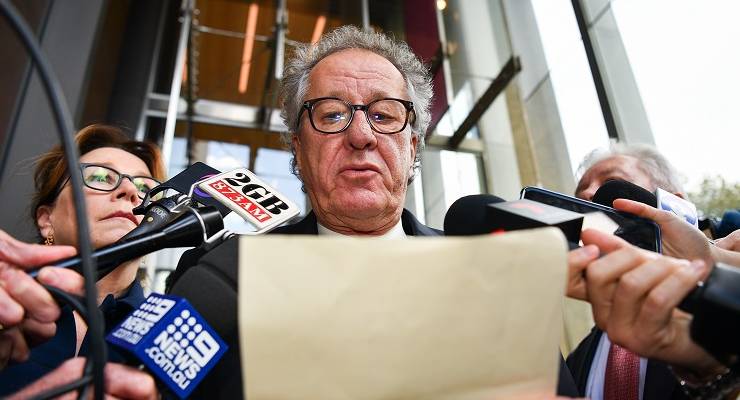
The Me Too movement has uncovered horrific tales and outed high-profile abusers.
With survivors feeling more confident to come forward, how should journalists cover these stories ethically? What makes a story stand up, and how should journalists mitigate the risk of defamation and allegations of cancel culture?
On Tuesday, Crikey news editor Emily Watkins was joined by Sydney Morning Herald senior journalist Jacqueline Maley, Our Watch fellow and freelance journalist Gina Rushton, and Inq reporter Georgia Wilkins in Crikey’s first Crikey Talks event, discussing the hairy side of Me Too reporting.
The Rush effect
Geoffrey Rush was awarded a record-high payout in his defamation case against The Daily Telegraph, which had published allegations of sexual misconduct. A ruling on the Telegraph’s appeal of the verdict came a little over a week after Maley and fellow journalist Kate McClymont published allegations in the SMH of sexual misconduct by one of Australia’s former top judges Dyson Heydon.
Although the SMH had spoken to more than a dozen sources, the risk of a defamation suit was always on the reporters’ minds when investigating the allegations, Maley says. They also had to push the story out earlier than planned after they got wind that a TV news station was intending to run a version of it.
“The lawyers were terrified, and we were terrified … This is a former high court judge. He’s an expert in evidence law. How are we ever going to pull this off?” she said.
“But I never doubted for a minute the veracity of what we’d been told and we also knew we’d done our homework. But that doesn’t mean we can’t get sued for a lot of money.”
A second concern was letting survivors know if Heydon did sue they might have to go to court to defend their statements.
Warning survivors about this, Rushton says, is an important part of managing expectations.
“It’s something as simple as ‘here’s how a columnist might write about you’, all the way to ‘would you get up on the stand [in court]?’” she said.
“Vulnerable sources in the case of sexual harassment or sexual assault have at some point had their consent taken away … You want to give them as much autonomy as you can.”
On whether Rush’s defamation payout had stalled Australia’s Me Too movement, Wilkins said: “I don’t think it killed the movement. I think certainly it had a pretty chilling effect … but I think there will still be stories coming out.”
The fight for reform
Australia’s stringent defamation laws are set for reform, with a public interest defence about to be introduced. Wilkins said the new laws could mitigate some of the legal risks.
“[The Daily Telegraph] had to rely on the truth defence [and] I don’t know if that’s ever been successful,” she said. “It’s a really big game-changer … It gives [journalists] another tool to defend these stories.
“It could change publishers’ risk appetites.”
“Cancel culture”, however, adds an element to defamation cases, Maley says.
“I think it works in favour of defendants,” she said. “They can point to so-called cancel culture or hysteria or a mob mentality around these issues and say: ‘Look how damaging this is to me.’”
All three journalists agreed Australia was likely to see more stories coming out.
“In the way the Rush case probably spooked editors and was off-putting to sources, I think the Heydon investigation … was a really good example of a decent template people can look to say: ‘Here’s how I can tell my story,’ ” Rushton says.
“Fingers crossed.”
Access to Crikey’s new Crikey Talks events are exclusive to Inside Access subscribers. To access exclusive offers, visit the Inside Access subscription page (or, if you haven’t already, subscribe to Crikey here).








Why is it that these pieces always miss the most important point.
The Heydon story was well-researched; there was corroboration; there was detail; and the article was written in a serious, responsible way.
The Rush “story” was prurient, malicious, unresearched and sensationally written rubbish.
It’s the difference between good and bad journalism. You of all people should know.
And I don’t think anyone has one milligram of sympathy for the Daily Telegraph or the “journalist” who wrote the story.
“[The Daily Telegraph] had to rely on the truth defence [and] I don’t know if that’s ever been successful,”
Well, quite. Is anyone surprised the Telegraph never succeeds at printing truth?